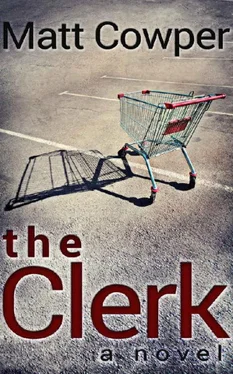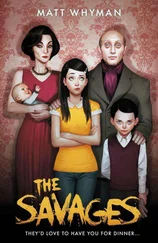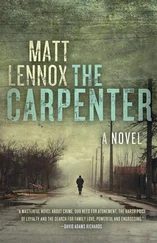He felt at home up until he passed by New Bern and its wide placid rivers, charming sailboats, and long-tongued bear-logo painted into an overpass hill. Then he stared ahead as Highway 70 unfurled in a seemingly-endless straight line. Little bordered the highway except trees and grass. His speedometer said he was going sixty-five (the speed limit was seventy, but Thomas didn’t want to overwork his old Malibu), but it felt like he wasn’t moving at all. He fell into highway hypnosis, so he turned on the radio to jolt his mind back to reality. The syrupy, auto-tuned pop songs didn’t really accomplish this, so he switched to NPR and listened as an earnest scientist and a bubbly interviewer discussed the intelligence of octopi — or octopuses, which Thomas was informed was the correct plural form of octopus. For a few minutes, he felt like a lucid receptacle of learning, but then the thrum of tire on asphalt and the endless trees just sitting there won out, and he turned off the radio and succumbed to the dullness. He didn’t feel like thinking anyway, he told himself dubiously.
He believed he passed by Kinston, Goldsboro, and Smithfield: he’d noticed a few things, several hours had elapsed, and signs were informing him that he was now nearing Raleigh. This was strong proof.
Thomas didn’t feel excitement or awe as he entered the urban jungle; he only wanted to get to the Dowling residence, and to do that he was not required to learn anything about Raleigh’s endless highways, boroughs, universities, or businesses. He just had to zero in on the few roads that would get him to where he wanted to go.
Finally, after dangerously changing lanes and feeling the cold breath of the Reaper, he exited Highway 40 and made his way onto a relatively quiet residential road. Well-manicured lawns and SUV-filled driveways smiled out at the world — but not so brightly that a passerby would actually decide to drop by. Every yard was decorated for the holidays in a charming-but-not-overblown manner. Some of the burghers were outside, either puttering in their yards or watching the kids or grandkids cavort. A straw-haired little girl, in pink helmet, pink pants, pink shoes, and pink t-shirt, rode slowly down the sidewalk on her pink bike. She sent Thomas a floppy wave, and removing one hand from the handlebars nearly caused her to crash into an azalea bush.
This was the subdivision of Oak Hills (though there were few oaks, and the hills were more like small bumps) where Dan and Emily lived. Thomas pulled into the Dowling residence at 703 Longleaf Pine Drive, and exhaled deeply. Finally he was safe from the motorist-horde.
The Dowling property looked much like the other properties in the neighborhood. The lawn was covered uniformly in Bermuda grass, its color a weak tan now that it was winter. Perfectly-sculpted shrubs stood guard near the house. The house itself was a two-story brick affair, as sedate as a lawyer’s office. The Dowling vehicles were visible in the two-car garage, and Thomas’s parents’ Traverse was parked behind them in the driveway. So everyone was here. Thomas got out of his car slowly; he’d only stopped once during the trip, for a quick bathroom break, and his legs felt as if they’d atrophied into uselessness. He gingerly walked along the lawn until he felt like an able-bodied man instead of a cripple.
As usual, his mother was the first to greet him. She burst out of the front door like a Christmas-spirit-infused meteor and half-jogged, half-hopped, towards him, her red Christmas sweater burning the eyes and her reindeer antlers bobbing jauntily. Thomas was enveloped in a smothering hug, and had to squirm to keep his ribs from breaking. Mothers may be unable to open that sealed-tight jar of peanut butter, and they may stumble when trying to lift heavy furniture, but when they have a chance to hug a child or grandchild, they become as powerful as linebackers.
After his mother released him and stepped back, Thomas looked at her gravely. It had been six months since he’d seen his parents, and his mother seemed to have aged a decade since then. Her sparkling eyes were surrounded by wrinkles, and her gray hair looked parched and unnatural, almost wig-like. She’d always been thin, but now her thinness looked like the skeletal weakness of old age.
“Hello there, my darling boy!” Jean Copeland warbled. “How was your drive?”
“Boring.”
“Boring? Why, you’re a stone’s throw away. Me and your father have to drive all the way up from Florida. I tell you, it’s been a looooong day already.”
“Yeah, you certainly look bushed,” Thomas said, grinning.
“Are you being sarcastic? Listen to you, sassing your momma! I tell you, if I slowed down for a second, I’d be out like a light. But I won’t slow down, because we’re all here now, on such a lovely day!”
She shepherded Thomas inside. As he stepped across the threshold, he felt, as he always did, like he’d entered a catalog or a movie set depicting an upper-middle-class home. Hardwood floors shone. The stairs and banister were stately. Tasteful pictures lined the walls. He turned into the gargantuan living room, with the theater-screen-sized television, the plush sofa that begged one to nap on it, the potted plants that looked as if they’d never wilt, the fireplace that was spotless because it was never used, and the imposing oak bookshelf, where light and skim-worthy volumes (well-thumbed) sat side by side hefty and learned tomes (covered with dust).
Dan was talking to his father. Both men held glasses of eggnog, and with their erect carriage, careful gestures, and clear, brook-no-argument voices, they were as lofty as senators. (Dan, who had put on a few pounds, admittedly looked slightly less senatorial.) Both men turned as one when he entered, and Thomas felt much like a functionary about to be interrogated by a congressional sub-committee.
“Hello, son,” his father said, extending a hand. Thomas shook it reluctantly, as Frank Copeland’s handshake rivaled Vernon Oxendine’s in strength.
As father and son looked each other over, Thomas saw that Frank Copeland had also aged. His hair, which had been receding for twenty years, had now almost completely deserted him; only a few wisps hung around his ears and the back of his head. Like his wife, he had an astounding amount of wrinkles. Yes, he still looked senatorial, but he certainly wasn’t a freshman senator.
“Hey, dad,” Thomas said. “Hey, Dan.”
Dan nodded and also proffered his hand. His handshake was firm but not cartoonishly muscular, the handshake of a man who didn’t feel the need to express his virility and power via a grasping of sweaty appendages.
“How are you, Thomas?” Dan asked. It was the light-yet-commanding voice that had swayed juries, judges, potential clients, and disgruntled secretaries. It made Thomas uneasy, though he knew Dan was a hell of a lawyer, and seemed to be a fair husband — especially considering the wife he had to put up with.
“I’m good,” Thomas replied. “Yourself?”
“Lots of work, as usual. How’s the grocery store?”
“The same as ever.”
“And old Vernon?”
Vernon and Dan had met once years ago, when Emily and Dan had visited Thomas at the store during one of their vacations to the Crystal Coast. Vernon’s rambunctiousness offended Dan’s lawyerly calm, and vice versa. After Vernon had asked how many lawyers it took to screw in a lightbulb, and then supplied the answer before anyone could hazard a guess, Dan had said goodbye curtly and walked out of the store. Emily, angry that her husband had let a lowly shopkeeper get under his skin, had followed in his wake. Vernon said nothing more, but his wink to Thomas was eloquent.
“Like the store: the same as ever.”
With these preliminaries over, Dan and Thomas’s father could return to their conversational topic, which was the price of gas.
Читать дальше












